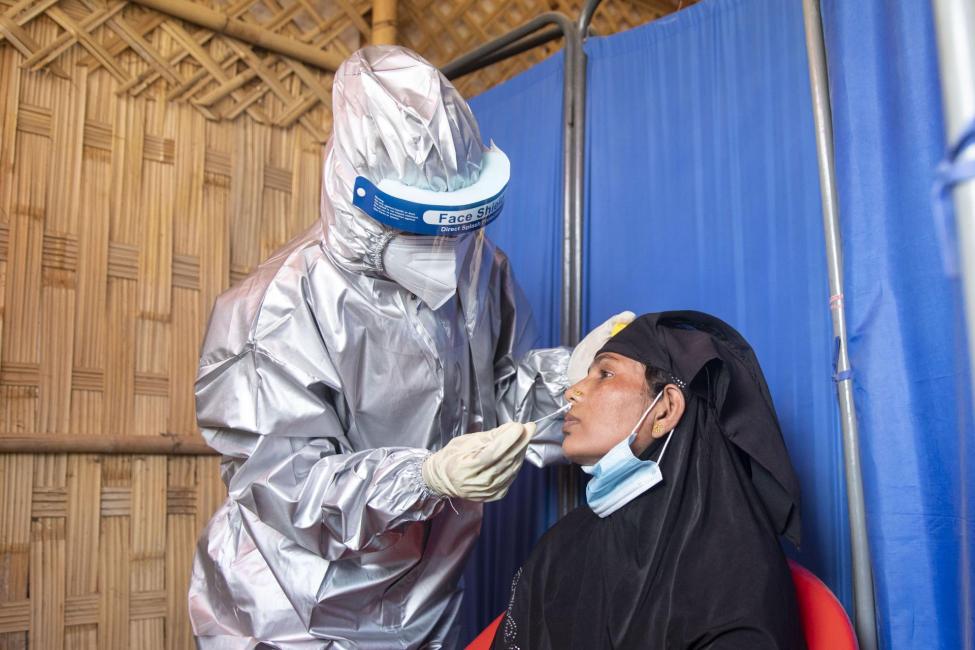-
Who We Are
WHO WE AREThe International Organization for Migration (IOM) is part of the United Nations System as the leading inter-governmental organization promoting since 1951 humane and orderly migration for the benefit of all, with 175 member states and a presence in over 100 countries.
About
About
IOM Global
IOM Global
-
Our Work
Our WorkAs the leading inter-governmental organization promoting humane and orderly migration, IOM plays a key role to support the achievement of the 2030 Agenda through different areas of intervention that connect both humanitarian assistance and sustainable development. Across Asia and the Pacific, IOM provides a comprehensive response to the humanitarian needs of migrants, returnees and host communities.
Cross-cutting (Global)
Cross-cutting (Global)
- Where we work
- Take Action
- Data and Resources
- 2030 Agenda
IOM Ramps Up Health Response as Second Wave of COVID-19 Strikes Cox’s Bazar
Cox’s Bazar – As a second wave of COVID-19 is ravaging South Asia, including Bangladesh, the International Organization for Migration (IOM) is working closely with the Government and the humanitarian community to ramp up the delivery of a wide range of support services for Rohingya refugees and host communities.
“It is imperative to strengthen our assistance and not let the situation deteriorate any further before it becomes impossible for the existing healthcare services to cope,” said Manuel Marques Pereira, IOM Deputy Chief of Mission in Bangladesh.
Following an upsurge in COVID-19 cases in May, local authorities imposed a strict lockdown in five Rohingya refugee camps in the Teknaf and Ukhiya sub-districts in Cox’s Bazar. Preparations for the vaccination campaign for the over 900,000 Rohingya refugees living in the camps are ongoing, but a launch date has yet to be confirmed.
To enhance surveillance and early detection, since early 2020, IOM has been running two severe acute respiratory infections treatment centres inside the refugee camps. Following the Government and Health Sector’s recommendations this May, IOM quickly scaled up their capacity from 120 beds to 173.
The two health centres, along with 10 other health facilities, collect samples from suspected COVID-19 patients and provide counselling on prevention and treatment. Samples are transported for testing to Cox’s Bazar’s official laboratory within the Institute of Epidemiology Disease Control and Research(IEDCR),with the results expected within 48 hours.
In May alone, 2,293 samples were collected from these facilities and transported for analysis, 133 patients whose tests were positive were subsequently admitted and 73 contacts were quarantined. Since the beginning of the response, these facilities have admitted close to 900 patients.
To improve early diagnosis and surveillance, IOM has recently opened six additional COVID-19 sentinel sample collection sites, in collaboration with the World Health Organization. To this end, 15 health care workers, including six medical officers, seven medical assistants, one midwife and one nurse were extensively trained on COVID-19 sample collection, transportation and biosafety.
IOM is part of the Rapid Investigation and Response Team set up by the Health Sector to follow up on the identification of COVID-19 cases and contact tracing in the camps. Since the beginning of the pandemic, these teams have been implementing the awareness campaign “No Mask, No Entry” mobilizing all service providers to ensure COVID-19 prevention measures are respected at humanitarian service points.
As part of its infection prevention and control measures, IOM also operates three ambulance decontamination facilities to minimize the risk of transmission among staff and beneficiaries. Additionally, teams regularly distribute personal protection equipment to IOM-supported health facilities.
A quarantine facility with 93 shelters for contacts of COVID-19 cases has also recently been established within the camps. This facility, which offers food, health check-ups, and referrals to other support services, has so far quarantined 114 contacts.
As part of IOM’s risk communication and community engagement activities, 350 community health workers regularly conduct health promotion sessions through household visits and courtyard sessions. Additionally, a dedicated dispatch and referral unit is responsible for transporting COVID-19 suspected and confirmed cases, the deceased and discharged individuals.
To further alleviate the patients’ distress and concerns, IOM mental health and psychosocial support teams based in health facilities assist all COVID-19 patients with individual counselling focusing on the impact of the pandemic, psychosocial well-being and coping strategies.
Dedicated support for IOM’s COVID-19 response in Cox’s Bazar is provided by the EU Civil Protection and Humanitarian Aid (ECHO), the US State Department’s Bureau of Population, Refugees, and Migration (PRM), Australia’s Department of Foreign Affairs and Trade (DFAT), the Foreign, Commonwealth and Development Office (FCDO), the World Bank, and Qatar Charity.
For more information, please contact Monica Chiriac, Tel: +880 1880 094 048, Email: mchiriac@iom.int, or Tarek Mahmud, Tel: + 880 1752 380 240, Email: tmahmud@iom.int, at IOM Bangladesh in Cox’s Bazar.
